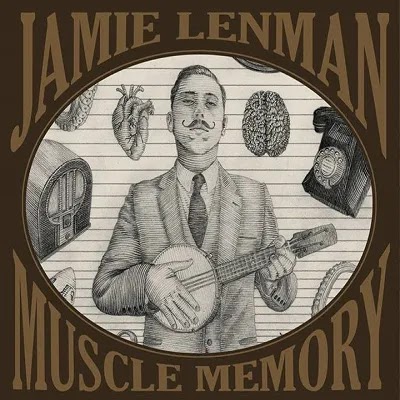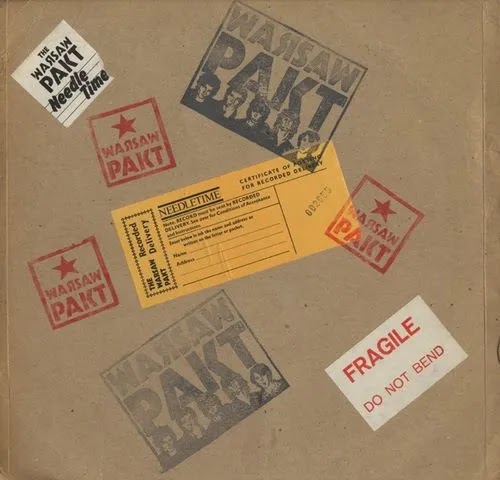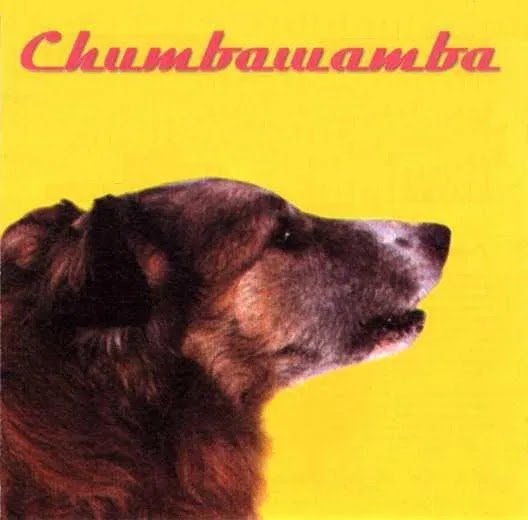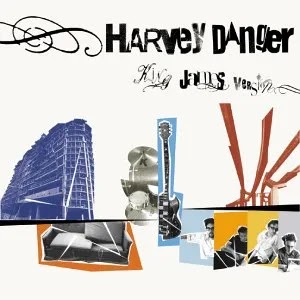Hey all, long time no post! Been busy the last little while, mostly working on my University degree. I haven't stopped writing music reviews, I've mostly just been posting them to RYM these days. I thought to dust this blog off I'd post a few of my favourites that I've written in the intervening time!
ALL - All (1998)
Allroy was here...
All are essentially the slightly less consistent little brother of punk veterens Descendents, born out of the ashes of the earlier band after lead vocalist Milo Aukerman left the music industry, seemingly forever. Certainly much less of a household name than the band that bought us Milo Goes to College, they ran through a number of vocalists during their run in the late 80s through to the early 2000s, and were much more prolific. Despite not having released anything since 2002, they still match the Descendents in amount of records released, at 10 or 11 depending on whether you count the EPs as well.
And out of all of these releases, their 1998 self titled compilation album is easily their most essential release alongside 1989's Allroy's Revenge, incidently their one album to rack up against any Descendents record. Compiling the absolute best of their songs from their formation through to 1995, that alone would be enough reason to check it out, as all of the filler that tended to appear on their main albums has been trimmed thoroughly. However, the band also decided to remix every track for a cleaner and perhaps more modern sound, sometimes radically changing the sound from the original production job. It legitemately sounds now as though they were all recorded at the same time, even though it's all culled from a period of about 7 years.
Another reason to pick it up, even if you happen to own most of their studio albums, is the inclusion of a Milo vocal track with "Just Like Them", representing one of the only musical appearances he would make before the Descendents would reform for 1996's Everything Sucks. The track had been released before, but with new All vocalist Scott Reynolds taking the reins, and getting to hear Milo take the helm on his own track is excellent. It's unclear when his vocal take was recorded, but it is nonetheless excellent, as was much of his work in the 90s.
Some highlights for me include "Dot", "Mary" and "Shreen", though the vast majority of the collection is absolutely indespensible Pop Punk that easily ranks up there with the most underrated music of the genre. Get it if you haven't, even if you never buy another All record again.
Gorillaz - The Singles Collection: 2001-2011 (2011)
On paper, there's nothing wrong with this compilation. All the band's most well known songs from 2000-2010 are here, the artwork consisting of a collage of Jamie Hewlett's artwork is a bit tacky but an alright touch, and is probably an alright release if you want to get into the band's music.
No, the issue I have with this release, as I do with many other compilations and retrospectives, is what it doesn't include. It may not be obvious, since all the "big name" tracks are here, but there are in fact some omissions throughout from singles the band released and yet aren't included. 911, Lil' Dub Chefin, Rhinestone Eyes, White Flag, Revolving Doors and Amarillo were ALL put out as singles in one way or another before this album dropped, and none are included here. And yet two remixes of prior tracks show up instead, which is funny considering they never came out as their own singles. This compilations doesn't even fill up a full CD, it's only 56 minutes including the remixes, and you're telling me you couldn't have padded it out a bit more?
THIS is how the tracklisting ought to have looked:
1. Tomorrow Comes Today / 2. Clint Eastwood / 3. 19-2000 / 4. Rock the House / 5. 911 / 6. Lil' Dub Chefin / 7. Feel Good Inc / 8. DARE / 9. Dirty Harry / 10. Kids With Guns / 11. El mañana / 12. Stylo / 13. Superfast Jellyfish / 14. On Melancholy Hill / 15. Rhinestone Eyes / 16. White Flag / 17. Doncamatic / 18. Revolving Doors / 19. Amarillo
(and then maybe the remixes if you have space for them)
There, fixed your cash grab. I'll never understand record labels, I swear.
Harvey Danger - King James Version (2000)
Harvey Danger followed up their surprise hit single "Flagpole Sitta" with the intriguing sophomore album King James Version, which expanded their sound and gave a better idea of what they were capable of musically than the slightly rough demo tracks that were utilised for their debut.
Comparisons to Radiohead's OK Computer are common, and the group were definitely inspired by that record, but the two albums are not terribly alike in direction. Rather than going for boundary pushing, Harvey Danger instead sought to refine their satirical songwriting formula, and in the process managed to hit a sweet spot that helps it to click for each song on the record.
The production on this record is much more clean and polished, and the arrangements are more diverse to match. Some of the bands best material is here as well; lead single "Sad Sweetheart Of The Rodeo" is easy in the top 3 of their best songs they ever recorded. Elsewhere is the track "Authenticity", which appears in a few movie soundtracks at the time, and a remake of a Merrymakers outtakes "Carjack Fever".
Sadly the album was fraught with issues. Their label got bought out and it took well over a year for them to get disentangled enough to put it out, but by then the momentum from Flagpole Sitta had waned enough that the album bombed, and after further issues prevented them from touring outside their home town, they split up acrimoniously. They reunited for a third album in 2005 but by then they were quite clearly jaded by their experiences and some of that youthful energy had waned.
King James Version is Harvey Danger's finest hour, and an album that deserves much more attention and acclaim than it's currently getting, I feel. Their songwriting was at it's best, as was their playing and ambitions, all of which come together for a really exciting record despite all the hardships that it had to face.
Copies are currently quite rare since it sold so poorly, but if you happen to find one it'll be one that's well worth cherishing.
Napoleon XIV - For God's Sake, Stop the Feces! (2023)
For God's Sake!!!
Y'know those times when an unreleased album finally gets released by some reissue label decades after the fact and you end up wondering "Boy! What were those Record Execs thinking, rejecting this?!" Well, this record is one of the few times I can quite honestly say "Gee, I see why they didn't want this."
Don't misunderstand, that doesn't mean this album is bad, but to say that it is a difficult listen (at least the first 15 that make up the unreleased record itself) would be putting it mildly. Simply put, it's as far away from the debut album as one could get without leaping to another genre entirely.
There's maybe two or three actual "songs" on here, the rest being a mixture of skits and rather interesting audio collage material that paints something of a story. And quite often, that story was extremely transgressive, not least for 1968-70, dealing with sexual assault, manic depression, and suicide, often in graphic detail. I imagine there would have been a boycott or two had it shown up in record stores at the time, and I can't say I would entirely blame them.
The production work is indeed pretty innovative for the time, featuring really impressive audio panning and effects that very few were tinkering with at the time (Frank Zappa being a notable exception). Speaking of Zappa, I'm surprised Samuels didn't shop it to his label when Warner Bros vetoed it, it would have sat at home with some of the odd stuff Bizarre/Straight was putting out around that time.
Would it have been innovative had it seen release at the time? Maybe, maybe not, it's impossible to say. As mentioned, it wasn't alone in some of the audio production innovations on display, but it's quite possible that it would have encouraged musicians to try taking bigger risks with their own releases. After all, if this record could get out, imagine what we could do as well. If nothing else it would certainly have been infamous, and spoken with some hushed awe today.
For those who can't quite digest the main offering, a selection of post-album recordings are included afterwards, mostly more straightforward piano-vocal songs, and they are quite enjoyable indeed.
In short, I recommend you check it out at least once. It's a very odd and fascinating listen, if nothing else...
Les Rallizes Dénudés - '77 Live (1991)
Les Rallizes Dénudés are a band surrounded in myth and misinformation, largely due to how they essentialy flew under the radar during their initial run, rarely giving interviews and mostly sticking to small venues and music festivals. Formed in 1967 by a group of Japanese students involved in a major radical movement in Japan during the late 60s, the creative direction of Les Rallizes largely rested on the shoulders of the lead singer and guitarist Takashi Mizutani, who himself has become a symbol of mystery in the band's fanbase due to just how little he was seen outside of the band. We didn't even know he had passed away in 2019 until two whole years later.
One of the things that adds to the mystery of the band is that next to no professional recordings of the band exist, and indeed they released nothing of their own work whilst active. The only exception is an appearance on the 1973 compilation OZ Days Live, which collected a variety of soundboard recordings done at a venue Les Rallizes frequented at the time. It would take until 1991, a full 24 years after their formation, for them to release anything of their own.
The three albums released in 1991, nicknamed by many as the "Rivista Trilogy" after the imprint it came out on, are archival collections from the earlier years of the group. '67–'69 Studio et live and Mizutani / Les Rallizes Dénudés combine a selection of studio and live recordings from their first four years, and are more in line with the psychedelic rock and folk sounds of the time period than the barrage of sound that they would later be acclaimed for. For that, you only need to look to the third album in the collection, the infamous '77 Live.
Recorded on the 12th of March 1977 (hence the name), '77 Live featured a near-complete soundboard recording of that night's show. And what a show it was! Even in the context of the numerous bootlegs of the group that exist, '77 Live towers over them all in the sheer power and energy the group was bringing to the table that night. Parallels have often been made to The Velvet Underground, and while there are similarities, this is a different experience all on its own.
The song's in the show's setlist are simple in concept, featuring some basic and borderline repetitive chord progressions, speckled in numerous places by Mizutani's reverb soaked vocals, singing some surprisingly dark lyrics that compliment his singing quite well. Just have a look at English translations to see what I mean.
But to call the band's repetitive song structures "boring" would be to miss the point entirely, as these songs don't need distinct parts to power through their runtime. Most vital to the experience is Mizutani's guitar work, sounding less like a conventional guitar performance and more like a swirling constant wave of feedback that he's reining in like a horse rider. It's both parts chaotic and yet carefully controlled, spurred along by a chugging baseline and fine backing by the rest of the group. which allowes for Mizutani's playing to really shine.
The recording quality isn't the best, clearly having been recorded onto a cassette tape (there's even a few dropouts in the sound in places), and yet '77 Live is not only one of the best shows the band would ever make, but also one of the best recorded. Most of the other circulating recordings of their shows were done from the audience and sound much less direct than this document of a fateful spring night in the late 70s.
TL,DR: An excellent piece of noise rock that sounds at least 10 years ahead of its time. Check it out.
Sid Vicious - My Way / Something Else / C’mon Everybody (1979)
Sid Vicious is probably one of the most tragic characters in the history of Punk. Died aged 21, grew up in a heroin addicted household that grew the addiction that eventually killed him, dated an unstable groupie and had one of the most turbulent relationships in show business before she was murdered, by who no one knows, but Sid caught the blame.
Even with his music it is regarded as a horrible waste, as all he recorded on his own were three studio cover songs and a small smattering of live shows in which he was often barely sober enough to stand. Even with the Sex Pistols, the group he idolised and eventually joined, signalling his rise to infamy, he is known perhaps erroneously as a talentless hack who had little business being in the band except to grow their brand of danger and bad attitudes.
Today he is known to most as a punk icon, the ultimate example of the movement's attitudes and anti-conformist ideals, but those that know of the man behind the myth consider him a confused idiot who could not play the bass, made a fool of himself on stage, potentially killed his girlfriend, and died long before his time in a way it seemed he was almost destined for.
And yet, when I hear his rendition of "My Way", I hear nothing but triumph. I hear the musician that Sid could have been had he lived longer. Against the world, and not afraid to tell them to shove it. As the strings in the back swell along to the roaring guitar leads, he just pile-drives his ideals for living, and makes the song truly his own more so than any AOR performer like Paul Anka who wrote the track ever could.
Sid, above all, sounds completely sincere here. This is Sid's song, hell, it might as well be his eulogy. He faces the final curtain in these lyrics, and he has his regrets. He lived a miserable life, had an erratic and infamous career, and died a true Rockstar’s death, cutting off any potential as a performer that was there, perhaps even to rival Johnny Rotten.
And, despite the naysayers, despite all that suffering and pain that people today know him for, at the same time he was instrumental in the visibility of Punk Rock, and the struggles that it faced. He was an everyman alongside his bandmates who wanted to make change in the world, he was angry and frustrated, and he made that known, and simultaneously connected with thousands, if not millions, of angry people all over the world, who were in the same position.
Johnny may have been the voice, but Sid was the image. And he wore that image like a badge of honour until the day he died.
And above all, he did it his way.
















